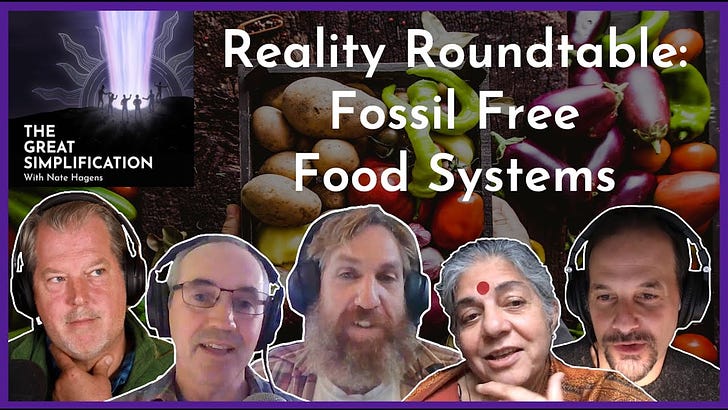Fossil Free Food Systems
Reality Roundtable #6 with Jason Bradford, Andrew Millison, Vandana Shiva, Daniel Zetah
On this Reality Roundtable, I’m pleased to be joined by small-scale farmer Jason Bradford, permaculturist and documentarian Andrew Millison, regenerative agriculture activist Vandana Shiva, and regenerative farmer and educator Daniel Zetah to discuss the feasibility of a food system fully or mostly independent of fossil fuel inputs. While a non-industrialized agriculture system is certainly possible (it was the norm for the majority of human history), what that will look like and how we even begin such a transition is daunting with a population of 8 billion humans to feed.
Jason Bradford has been affiliated with Post Carbon Institute since 2004, first as a Fellow and then as Board President. He worked for the Center for Conservation and Sustainable Development at the Missouri Botanical Garden, was a Visiting Scholar at U.C. Davis, and during that period co-founded the Andes Biodiversity and Ecosystem Research Group (ABERG). He decided to shift from academia to learn more about and practice sustainable agriculture, and in the process, completed six months of training with Ecology Action (aka GrowBiointensive) in Willits, California, and then founded Brookside School Farm.
Andrew Millison is an innovative educator, storyteller and designer. He founded the Permaculture Design education program at Oregon State University (OSU) in 2009. At OSU Andrew serves as an Education Director and Senior Instructor who offers over 25 years of experience, and a playful approach to regenerative design. Andrew is also a documentary videographer who travels the world documenting epic permaculture projects in places such as India, Egypt, Mexico, Cuba, and throughout the US. You can view his videos and series on his YouTube channel.
Vandana Shiva is a well known activist, author of many books, and is a global champion on regenerative local agriculture, biodiversity and nutritious food. She has a PhD in physics and 40 years ago founded the Research Foundation for Science, Technology and Ecology, an independent research institute that works on the most significant ecological problems of our times.
Daniel grew up on a farm in Minnesota where he learned to fix all manner of things driven from an insatiable curiosity about how things worked. He studied economics and business at university. After waking to our planetary predicament, he became a full time environmental activist, then moved to an off grid community in the mountains where he studied permaculture and built straw bale houses. He moved back to America to help steer culture in a more sane direction. He and his wife Stephanie moved back to the family farm in Minnesota where they are growing 80% of their calories, rebuilding the local ecology, and educating and empowering people to wrest back control of their sovereignty as human beings.
How do we teach people the skills they’ll need as fossil inputs become less affordable, reliable, and accessible? Can we create a cultural shift towards a slower lifestyle that is more connected to the land which provides us food? What do the people of a society look like where we are once again centered around agriculture and in tune with the flows of nature? How would our relationship with jobs and the land have to change?
In case you missed it…
On last week’s episode, I was again joined by risk expert Chuck Watson for a candid discussion of the nuclear developments between Russia and the United States. As the world’s attention is focused on the events in the Middle East, US testing and development of new nuclear weapons and Russia’s decision to pull out of the Nuclear Test Ban Treaty last week have been overlooked and underreported by major media. Yet, a wider view suggests these trends represent some of the most imminent risks to life on Earth as we know it.
If you appreciate The Great Simplification podcast…
Be sure to leave a review on your preferred podcast platform! Leaving reviews helps the podcast grow, which helps spread awareness of our systemic situation from experts in ecology, energy, policy, economics, technology, and community building so that we can better understand - and respond to - the challenges of the coming decade.
The Great Simplification podcast is produced by The Institute for the Study of Energy and Our Future (ISEOF), a 501(c)(3) organization. We want to keep all content completely free to view globally and without ads. If you’d like to support ISEOF and it’s content via donation, please use the link below.






Today’s roundtable was so INSPIRING!! The speakers authentically talked about the healthy changes in their lives as well as gave reasonable expectations for others sharing their concerns about the essential need to change agricultural practices around the world. In addition, I truly appreciated their advocacy for SENSIBLE and NEEDED dramatic changes in current misdirected governmental practices that significantly contribute to global environmental degradation and global food insecurity. THANKS!